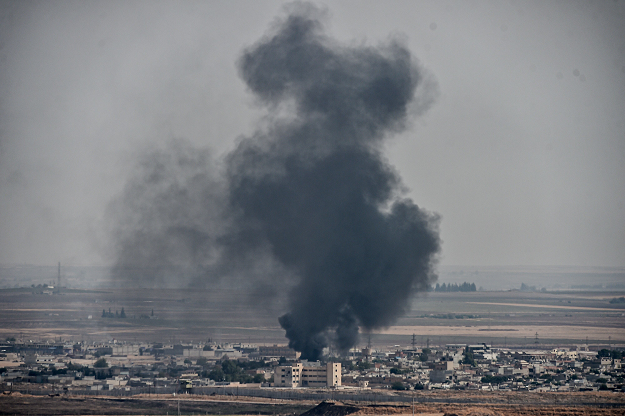
The nature of the beast is now more local than foreign.
It began when exercising their democratic rights, the disgruntled Syrians took to the street, in 2011, to demand economic and political reforms. They also wanted freedom of expression in the political sphere. This movement to democracy was one of the many strains Syria had attracted from the Arab Spring that had erupted in the neighbouring countries.
Not used to disagreements, the Syrian government, headed by the Assads for the last four decades, then responded angrily. On March 18, 2011, the Syrian Army opened fire on the demonstrators killing four people with many more arrested. Shocked by the treatment of the government, more people came out on the streets in different parts of the country. Instead of repositioning its responses, the administration used more force to control the damage. In retaliation, a group of defected soldiers and army officers formed the Free Syrian Army (FSA) to protect the protesting civilians. The group would in no time become powerful on the back of other anti-government forces. No sooner Syria descended into a full-blown civil war.
A war that began between Syrians and their government escalated into varying wars each with its own protagonist and agenda. Supported by its Sunni allies in the Middle East, the US demanded regime change. Taking a leaf from Iraq where the end of Saddam Hussein’s government had brought more misery than relief, Iran and Russia defied the US demand and thwarted it militarily. With this outside involvement, the war is no longer Syrian. It has become regional and even international, with an overtone of sectarian crisis.
Today, Syria is battling three wars: Coalition efforts to defeat the Islamic State in Iraq and Syria (ISIS); violence between the Syrian government and opposition forces; and military operations against Syrian Kurds by Turkish forces.
The US-led regime change wars have wrought havoc in the Middle East. Each regime change from Iraq to Libya to Syria was masked as a rescue operation to liberate people from the humanitarian crises unleashed by the bloodthirsty dictators. Not that it was the first of its kind of crises the US had perpetrated. A big number of countries stand witness to the interventionist policies of the US that would always bring more suffering than relief.
With the end of the Cold War and democracy becoming the only ideology that promised salvation from all kinds of bounds and fetters, scholars started seeing the world come of age. What other bigger event could unfold — Europe was unified and its eastern part had come out of the Russian shadow, the Central Asian states were free form the Bolshevik yoke, colonialism had almost tapered off, proliferation of nuclear weapons had been controlled through various treaties, and with the rise of Asia the world was heading towards a more equitable survival.
This, however, proved a ‘purpose-built façade’ with little tenacity to hold itself out for too long. The slide was rather quick. Just as the communist propelled social system was being defeated, a new disintegrative system — terrorism — was pushed through the US military establishment to justify interventions for regime change.
This enemy on the gate was there for a long haul. It would no more be a straightforward rivalry. An enemy in one war theatre would be a friend in another. If in Afghanistan, al Qaeda was a threat to homeland security, it joined hands with the same militant organisation in Syria. Lent to multiplication and manipulation, the Jihadi proxies would later consolidate into a broader percept — the Islamic State in Iraq and Syria (ISIS). Contrary to its overriding mission of reincarnating the Caliphate, the ISIS instead obliterated Iraq and Syria — the two iconic cultural sites of Islamic heritage. Today, ISIS has its fangs in every country, but not without casting a negative effect on the West. Bred on the anti-Muslim hysteria, a significant number of voters in Europe have grown against Muslim migrants. In reaction, they voted to power the ultranationalist parties to cleanse Europe of the outsiders. Trump and Brexit owe their success to the Islamophobia industry that grew dramatically after the 9/11 attack.
The Syrian war unfolded some of the worst humanitarian crisis of the 21st century. The United Nations had put the Syrian death toll to 400,000 in 2016. As the war becomes more complex, diffused and with no sign of abatement, international monitoring groups, including the UN, have stopped counting causalities, saying: “It is virtually impossible to verify how many died.”
According to the United Nations High Commissioner for Refugees, over 5.6 million Syrians have registered as refugees. The majority of these refugees moved into neighbouring countries. Not only did these migrating people bring an economic burden to the host countries, they also opened a new ethnic fault-line concerning the Kurds. Soon, doors were being closed on the migrating refugees, with European countries appearing the cruellest. It was not until the pictures of drowning children in the Mediterranean Sea and refugees living in dilapidated conditions in makeshift camps on borders hit the social media picking on the European conscience, did the European leadership start showing its moral side.
Everything has changed in Syria in these 10 years, except its political structure. Ten years is a long period for a civil war of such ferocity triggering a huge transformation. The World Bank has assessed the damage to be at $200 billion while according to the United Nation Economic and Social Commission for West Asia, in order to restore Syria to its 2010 condition, almost $400 billion would be needed.
The question is: has the Syrian government started wrapping its head around the reconstruction options that includes finding investors to foot the bills, or will Syria become another Afghanistan for proxy war among regional and global powers?
Published in The Express Tribune, March 21st, 2020.
Like Opinion & Editorial on Facebook, follow @ETOpEd on Twitter to receive all updates on all our daily pieces.












COMMENTS (1)
Comments are moderated and generally will be posted if they are on-topic and not abusive.
For more information, please see our Comments FAQ